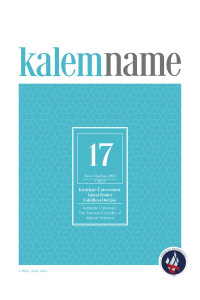Abstract
Bilgi felsefesinin kendisine konu edindiği temel soru “Bilgi nedir?” sorusudur. Bu çalışma, Platon’un Theaetetus diyaloğunda bilginin tanımına dair ortaya koyduğu sorunları incelemektedir. Platon’un bilgi felsefesi, idealar teorisi temelinde şekillenmiş olup unutulan bilginin hatırlanması (anamnesis) ve diyalektik yöntemle bilginin neliğinin kavranması hususunu içerir. Theaetetus diyaloğunda, bilginin algı (aisthesis), doğru inanç (alêthê doxa) ve kanıta dayalı doğru inanç (logou alêthê doxan) olarak tanımlandığı üç farklı önerme ele alınır. Bu tanımların nasıl tartışıldığı ve çürütüldüğü detaylandırılırken, Platon’un bilgiye dair epistemik kaygıları ve bilgi tanımına eklediği “logos” koşulunun yansımaları da ele alınır. Platon’un, idealar dünyasındaki bilgi ile algılanabilir dünyadaki bilgiyi logos şartı özelinde birleştirme çabası, onun Theaetetus diyaloğu bağlamında bilgi tanımında kesin bir sonuca varamamasının nedenini de açıklar. Platon, her üç tanımın da yeterli olmadığını belirtir ve bilginin kesin bir tanımına ulaşmamayı tercih eder. Bu çalışma, Platon’un geleneksel bilgi tanımına dair epistemik kaygılarını ve bu kaygıların çağdaş epistemolojideki Gettier sorunu olarak karşımıza çıkan yansımalarını değerlendirir.
References
- Başdemir, Hasan Yücel. “Gettier ve Bilgide Şans Unsuru”. Felsefe Dünyası 50 (2/2009), 122-140.
- Bolay, Süleyman Hayri. Felsefe Doktrinleri ve Terimleri Sözlüğü. İstanbul: Atlas Yayınları, 2018.
- Cevizci, Ahmet. Felsefenin Kısa Tarihi. İstanbul: Say Yayınları, 2017.
- Chappell, Sophie Grace. “Plato on Knowledge in the Theaetetus”. The Stanford Encyclopedia of Philosophy (Spring 2021 Edition). ed. Edward N. Zalta. https://plato.stanford.edu/archives/spr2021/entries/plato-theaetetus.
- Chisholm, Roderick M. Foundations of Knowing. Minneapolis: University of Minnesota Press, 1983.
- Chisholm, Roderick M. Theory of Knowledge. New Jersey: Prentice-Hall, 1989.
- Çotuksöken, Betül. Felsefe: Özne-Söylem. İstanbul: Notos Kitap, 2013.
- Gettier, Edmund L. “Is Justified True Belief Knowledge?”. Analysis 23/6 (1963), 121-123.
- Güzel, Cemal. “Aristoteles’te Bilgi, Bilim, Bilgide Kesinlik”. Hacettepe Üniversitesi Edebiyat Fakültesi Dergisi 20/1 (2003), 126-139.
- Kenny, Anthony. Batı Felsefesinin Yeni Tarihi: Antik Felsefe. çev. Serdar Uslu. İstanbul: Küre Yayınları, 2011.
- Plantinga, Alvin. Warrant: The Current Debate. Oxford: Oxford University Press, 1993.
- Platon. Devlet. çev. Sabahattin Eyüboğlu-M. Ali Cimcoz. İstanbul: İş Bankası Kültür Yayınları, 2013.
- Platon. Diyaloglar 1. “Menon”. çev. Adnan Cemgil. İstanbul: İletişim Yayınları, 1996.
- Platon. Diyaloglar 2. “Theaitetos”. çev. Macit Gökberk. İstanbul: İletişim Yayınları, 1996.
- Pritchard, Duncan. Epistemic Luck. New York: Oxford University Press, 2005.
- Runciman, Walter Garrison. Plato’s Later Epistemology. Cambridge: Cambridge University Press, 1962.
Abstract
The fundamental question addressed by epistemology is “What is knowledge?”. This study examines the problems Plato presents regarding the definition of knowledge in his Theaetetus dialogue. Plato’s epistemology is shaped by his theory of forms and involves the recollection of forgotten knowledge (anamnesis) and the understanding of the nature of knowledge through the dialectical method. In the Theaetetus dialogue, three different propositions are considered for defining knowledge: perception (aisthesis), true belief (alêthê doxa), and justified true belief (logou alêthê doxan). While detailing how these definitions are debated and refuted, Plato’s epistemic concerns about knowledge and the implications of the “logos” condition he adds to the definition of knowledge are also examined. Plato’s effort to unify knowledge in the realm of forms with knowledge in the perceptible world, specifically through the condition of logos, explains why he does not reach a definitive conclusion about the definition of knowledge in the context of the Theaetetus dialogue. Plato indicates that none of the three definitions are sufficient and chooses not to arrive at a definitive definition of knowledge. This study evaluates Plato’s epistemic concerns regarding the traditional definition of knowledge and how these concerns manifest in contemporary epistemology as the Gettier problem.
References
- Başdemir, Hasan Yücel. “Gettier ve Bilgide Şans Unsuru”. Felsefe Dünyası 50 (2/2009), 122-140.
- Bolay, Süleyman Hayri. Felsefe Doktrinleri ve Terimleri Sözlüğü. İstanbul: Atlas Yayınları, 2018.
- Cevizci, Ahmet. Felsefenin Kısa Tarihi. İstanbul: Say Yayınları, 2017.
- Chappell, Sophie Grace. “Plato on Knowledge in the Theaetetus”. The Stanford Encyclopedia of Philosophy (Spring 2021 Edition). ed. Edward N. Zalta. https://plato.stanford.edu/archives/spr2021/entries/plato-theaetetus.
- Chisholm, Roderick M. Foundations of Knowing. Minneapolis: University of Minnesota Press, 1983.
- Chisholm, Roderick M. Theory of Knowledge. New Jersey: Prentice-Hall, 1989.
- Çotuksöken, Betül. Felsefe: Özne-Söylem. İstanbul: Notos Kitap, 2013.
- Gettier, Edmund L. “Is Justified True Belief Knowledge?”. Analysis 23/6 (1963), 121-123.
- Güzel, Cemal. “Aristoteles’te Bilgi, Bilim, Bilgide Kesinlik”. Hacettepe Üniversitesi Edebiyat Fakültesi Dergisi 20/1 (2003), 126-139.
- Kenny, Anthony. Batı Felsefesinin Yeni Tarihi: Antik Felsefe. çev. Serdar Uslu. İstanbul: Küre Yayınları, 2011.
- Plantinga, Alvin. Warrant: The Current Debate. Oxford: Oxford University Press, 1993.
- Platon. Devlet. çev. Sabahattin Eyüboğlu-M. Ali Cimcoz. İstanbul: İş Bankası Kültür Yayınları, 2013.
- Platon. Diyaloglar 1. “Menon”. çev. Adnan Cemgil. İstanbul: İletişim Yayınları, 1996.
- Platon. Diyaloglar 2. “Theaitetos”. çev. Macit Gökberk. İstanbul: İletişim Yayınları, 1996.
- Pritchard, Duncan. Epistemic Luck. New York: Oxford University Press, 2005.
- Runciman, Walter Garrison. Plato’s Later Epistemology. Cambridge: Cambridge University Press, 1962.
Details
| Primary Language | Turkish |
|---|---|
| Subjects | Epistemology |
| Journal Section | Araştırma Makalesi / Research Article |
| Authors | |
| Early Pub Date | June 25, 2024 |
| Publication Date | June 26, 2024 |
| Submission Date | June 12, 2024 |
| Acceptance Date | June 15, 2024 |
| Published in Issue | Year 2024 Volume: 9 Issue: 17 |
Kırıkkale University, Faculty of Islamic Sciences Campus, 71450 Yahşihan / Kırıkkale, Türkiye.
kalemnamedergi@gmail.com | e-ISSN: 2651-3595
Social Media Accounts:
Twitter: @kalemnamedergi • Instagram: @kalemnamedergi
Indexes




